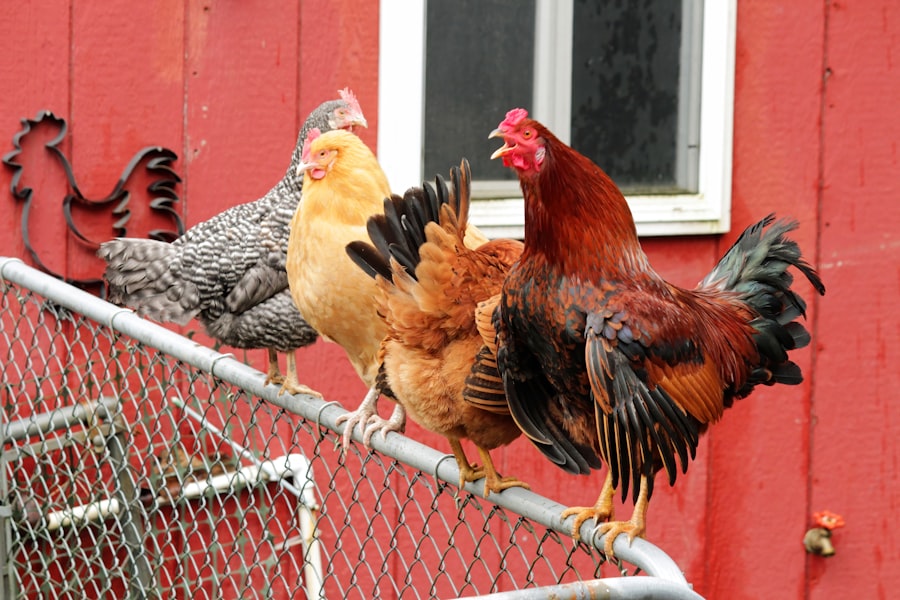Keeping chickens has become an increasingly popular hobby for many people, whether it be for the joy of raising pets or for the production of fresh eggs. The idea of having a small flock of chickens in your backyard has gained traction in recent years, as more and more people are becoming interested in sustainable living and self-sufficiency. There are numerous benefits to keeping chickens, including the availability of fresh eggs, natural pest control, and the satisfaction of caring for animals.
Key Takeaways
- Keeping chickens can be a rewarding and enjoyable hobby for beginners.
- Benefits of keeping chickens include fresh eggs, natural pest control, and fertilizer for gardens.
- Choosing the right breed of chickens depends on factors such as egg production, temperament, and climate.
- Preparing a chicken coop involves providing adequate space, ventilation, and nesting boxes.
- Feeding and watering chickens requires a balanced diet and clean water, while maintaining good hygiene and monitoring for common health issues.
Benefits of Keeping Chickens
One of the main benefits of keeping chickens is the availability of fresh eggs. Unlike store-bought eggs, which can be weeks old by the time they reach your kitchen, fresh eggs from your own chickens are packed with nutrients and have a richer flavor. They are also free from any chemicals or hormones that may be present in commercially produced eggs. Additionally, raising your own chickens allows you to have control over their diet, ensuring that they are fed a healthy and balanced diet.
Chickens can also provide natural pest control in your garden. They love to eat insects, slugs, and other pests that can damage your plants. By allowing your chickens to roam freely in your garden, you can reduce the need for chemical pesticides and promote a healthier ecosystem. Not only does this benefit your garden, but it also provides entertainment for the chickens as they scratch and peck at the ground.
Lastly, keeping chickens can bring joy and satisfaction to your life. Chickens are social animals that can form bonds with their owners. They have unique personalities and behaviors that can be fascinating to observe. Many people find great pleasure in caring for their chickens and watching them grow and thrive. It can also be a great learning experience for children, teaching them about responsibility and where their food comes from.
Choosing the Right Breed of Chickens
When it comes to choosing the right breed of chickens, it is important to consider your needs and the climate in which you live. Some breeds are better suited for egg production, while others are bred for meat production. There are also dual-purpose breeds that can be used for both purposes. It is important to do your research and choose a breed that aligns with your goals.
Popular breeds for egg production include the Rhode Island Red, Leghorn, and Sussex. These breeds are known for their high egg production and can lay up to 300 eggs per year. If you are interested in meat production, breeds such as the Cornish Cross or the Plymouth Rock are good options. These breeds grow quickly and have a good meat-to-bone ratio. For those looking for a dual-purpose breed, the Australorp or the Orpington are popular choices.
In addition to considering the purpose of your chickens, it is also important to consider their size and temperament. Some breeds are larger and more docile, while others are smaller and more active. It is important to choose a breed that fits well with your lifestyle and the space you have available.
Preparing a Chicken Coop
Before bringing home your chickens, it is important to have a safe and secure coop ready for them. A chicken coop provides shelter from the elements, protection from predators, and a place for chickens to roost and lay eggs. It is important to invest time and effort into building or purchasing a coop that meets these requirements.
When building a chicken coop, you will need a variety of materials and tools. The materials will depend on the design of the coop, but typically include wood, wire mesh, roofing material, and hardware such as hinges and latches. You will also need basic tools such as a saw, hammer, drill, and screwdriver.
There are different types of coops to choose from, depending on your needs and preferences. Stationary coops are built on a fixed location and provide a permanent home for your chickens. Mobile coops, also known as chicken tractors, are designed to be moved around your yard, allowing your chickens to have access to fresh grass and insects. The type of coop you choose will depend on factors such as the size of your flock, the space you have available, and your personal preferences.
Designing a Chicken Coop
When designing a chicken coop, there are several important features to consider. First and foremost, you will need nesting boxes for your hens to lay their eggs. These boxes should be dark and secluded, providing a comfortable and private space for the hens to lay their eggs. It is recommended to have one nesting box for every 3-4 hens.
Proper ventilation is also crucial in a chicken coop. Good airflow helps to prevent the buildup of moisture and ammonia, which can lead to respiratory issues in chickens. Ventilation can be achieved through windows, vents, or openings in the coop. It is important to ensure that the coop is well-ventilated without being drafty.
Predator-proofing the coop is another important consideration. Chickens are vulnerable to predators such as raccoons, foxes, and even neighborhood dogs. The coop should be built with sturdy materials and secure locks to prevent any unwanted visitors from getting in. It is also important to bury wire mesh around the perimeter of the coop to prevent predators from digging under.
Feeding and Watering Chickens

Feeding chickens a balanced diet is essential for their health and egg production. Chickens require a diet that is high in protein, vitamins, and minerals. A good quality commercial chicken feed can provide all the necessary nutrients for your chickens. It is important to choose a feed that is appropriate for the age and purpose of your chickens.
In addition to commercial feed, chickens can also benefit from kitchen scraps and garden waste. They enjoy a variety of fruits, vegetables, and grains. However, it is important to avoid feeding them anything that is toxic to chickens, such as avocado, chocolate, or onions.
Providing clean water for your chickens is also crucial. Chickens require fresh water daily to stay hydrated and healthy. There are different types of waterers available, including gravity-fed waterers and nipple waterers. It is important to clean and refill the waterers regularly to prevent the growth of bacteria.
Chicken Health and Hygiene
Keeping your chickens healthy and maintaining good hygiene in the coop is essential for their well-being. Chickens can be susceptible to a variety of health issues, including respiratory infections, parasites, and nutritional deficiencies. It is important to observe your chickens regularly for any signs of illness or distress.
To prevent common health issues in chickens, it is important to provide a clean and dry environment in the coop. Regularly cleaning out the coop and replacing bedding material can help prevent the buildup of bacteria and parasites. It is also important to provide dust baths for your chickens, as this helps to keep their feathers clean and free from mites.
Vaccinations and medications may also be necessary to keep your chickens healthy. Consult with a veterinarian or poultry expert to determine the appropriate vaccinations and medications for your flock. It is important to follow the recommended schedule for vaccinations and administer them properly.
Egg Laying and Collection
Understanding the egg-laying process in chickens is important for managing your flock. Chickens typically start laying eggs at around 5-6 months of age, although this can vary depending on the breed. The egg-laying cycle lasts approximately 24-26 hours, with most hens laying one egg per day.
When it comes to collecting eggs, it is important to do so regularly to prevent them from being damaged or eaten by the chickens. Eggs should be collected daily or at least every other day. It is important to handle the eggs gently and avoid washing them, as this can remove the protective coating on the shell.
Different breeds of chickens can lay eggs of different colors and sizes. For example, Leghorn chickens typically lay white eggs, while Rhode Island Reds lay brown eggs. There are also breeds that lay blue or green eggs, such as the Araucana or Ameraucana. The size of the eggs can also vary depending on the breed, with some breeds laying larger eggs than others.
Troubleshooting Common Chicken Problems
Like any other animal, chickens can experience a variety of issues that may require troubleshooting. Some common problems that may arise with chickens include egg-eating, feather-pecking, and aggression. It is important to address these issues promptly to prevent them from becoming a habit or causing harm to the chickens.
If you notice that your chickens are eating their own eggs, it is important to identify and address the underlying cause. This behavior can be a result of nutritional deficiencies, boredom, or overcrowding. Providing a balanced diet, plenty of enrichment activities, and adequate space can help prevent egg-eating behavior.
Feather-pecking and aggression among chickens can also be problematic. This behavior can be a result of stress, overcrowding, or a lack of socialization. Providing enough space for your chickens and ensuring that they have access to fresh air and sunlight can help reduce stress levels. It is also important to introduce new chickens slowly and monitor their interactions to prevent aggression.
Regularly observing your chickens for signs of illness or distress is crucial for troubleshooting any potential problems. Changes in behavior, appetite, or appearance may indicate an underlying health issue that needs to be addressed. Consulting with a veterinarian or poultry expert can help diagnose and treat any health issues that may arise.
Conclusion and Next Steps for Keeping Chickens
Keeping chickens can be a rewarding and fulfilling experience for beginners. The benefits of fresh eggs, natural pest control, and the joy of raising pets make it an attractive hobby for many people. However, it is important to do thorough research and preparation before bringing home your chickens.
There are numerous resources available online and in books that can provide more in-depth information on keeping chickens. Local chicken groups and suppliers can also be a valuable source of information and support. By taking the time to learn about the needs and requirements of chickens, you can ensure a successful and enjoyable experience as a chicken keeper.
If you’re just starting out with keeping chickens, you might be interested in learning about what other types of poultry can eat. Poultry Wizard has a helpful article on whether geese can eat chicken feed. It’s always good to know if you can provide the same feed for multiple types of birds. Check out the article here for more information.
FAQs
What are the benefits of keeping chickens?
Keeping chickens can provide a source of fresh eggs, fertilizer for gardens, and entertainment. They also help control pests and weeds in the yard.
What do chickens need to be healthy?
Chickens need access to clean water, a balanced diet of feed, shelter from the elements, and protection from predators. They also need space to move around and exercise.
How much space do chickens need?
Chickens need at least 2-3 square feet of space per bird in their coop, and at least 8-10 square feet of outdoor space per bird to roam and forage.
What kind of housing do chickens need?
Chickens need a secure coop to sleep in at night, with nesting boxes for laying eggs. The coop should be well-ventilated and protected from predators. Outdoor space should be fenced to keep chickens in and predators out.
What do chickens eat?
Chickens need a balanced diet of commercial feed that includes protein, vitamins, and minerals. They also enjoy foraging for insects, grass, and other plants.
How often do chickens lay eggs?
Most chickens lay eggs daily or every other day, depending on the breed and age of the bird. Some breeds are better layers than others.
What should I do with excess eggs?
Excess eggs can be eaten, given to friends and family, or sold. It is important to properly clean and store eggs to prevent contamination and spoilage.
What are some common health issues for chickens?
Common health issues for chickens include respiratory infections, parasites, and egg-laying problems. Regular check-ups and proper care can help prevent and treat these issues.
Do I need a rooster to have hens lay eggs?
No, hens will lay eggs without a rooster present. However, if you want fertilized eggs to hatch into chicks, you will need a rooster.
Meet Walter, the feathered-friend fanatic of Florida! Nestled in the sunshine state, Walter struts through life with his feathered companions, clucking his way to happiness. With a coop that’s fancier than a five-star hotel, he’s the Don Juan of the chicken world. When he’s not teaching his hens to do the cha-cha, you’ll find him in a heated debate with his prized rooster, Sir Clucks-a-Lot. Walter’s poultry passion is no yolk; he’s the sunny-side-up guy you never knew you needed in your flock of friends!







